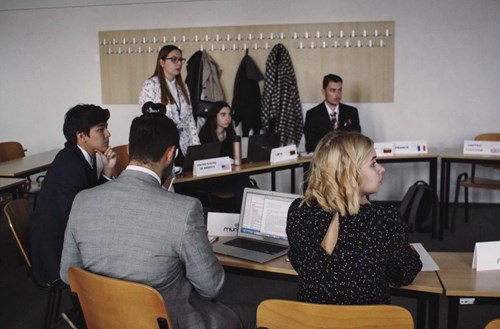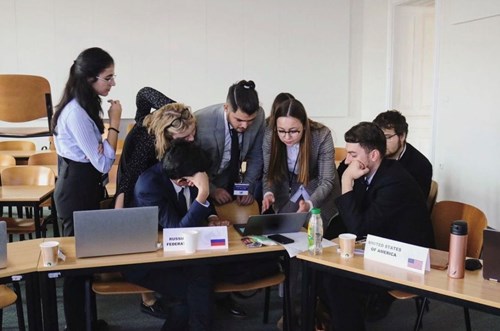
Elizaveta Filippova
Bachelor’s in International Relations and European Politics, graduated in 2021
Coming from Russia / Ukraine, she is currently studying MA in Human Rights and Multi-Level Governance at the University of Padua and undergoing vocational training as a Development Intern at the Organized Crime and Corruption Reporting Project (OCCRP).
interviewed by Michaela Nespěchalová, April 2024
- Could you provide a few memorable moments from your experience at the Faculty of Social Studies?
Even though my classmates and I had to study remotely for half of the bachelor’s program, the entire three years of education were very memorable. Not only did I gain knowledge in various disciplines related to International Relations, but I also met numerous colleagues from around the world who expanded my understanding of various cultures and societies.
I particularly remember how shocked I was when I first saw the variety of optional courses we could choose from at the Faculty of Social Studies and at Masaryk University as a whole. For example, I often recall the concepts I learned from the course in Populism and Authoritarianism from the Department of Sociology, as well as the basic principles of economics I discovered while taking extracurricular electives. I’m very grateful to the university for providing me with such a unique opportunity for multi-disciplinary studies.
I was also amazed by the ethics and professionalism of our professors, who were always accessible for any discussion and provided detailed feedback on my assignments. Both the freedom to choose and the variety of choice in courses, along with the openness of professors, are not typical for the education system of post-Soviet countries; hence, I was pleasantly surprised.
2. In what ways has your undergraduate degree in International Relations and European Politics influenced your academic or professional trajectory?
My undergraduate education has significantly shaped my academic interests, political views, and career aspirations. During my time in Brno, I developed a particular interest in Peace and Conflict Studies and Human Rights, which inspired me to pursue an MA in Human Rights and Multi-Level Governance, with a specific focus on international humanitarian and criminal law and human rights protection in conflict-affected countries.
Moreover, thanks to the well-rounded education in the bachelor’s program, I learned about the history and politics of various regions. This proved to be very important during my research internship with CIVICUS, as the organization focuses on developing civil society in the Global South. Thus, I was equipped with sufficient knowledge to conduct interviews with human rights defenders from across the Middle East, Africa, and Asia regions, in addition to applying my understanding of the European political context, which I also developed extensively during the bachelor’s program.
In general, my undergraduate education made me realize that my interests and values align with the work in the non-profit sector, particularly concerning the advancement of democracy, the rule of law, and human rights, as well as humanitarian response amid armed conflicts.
3. Would you mind giving some instances of the particular skills and knowledge acquired during your studies that have proven beneficial in your career?
In addition to acquiring knowledge in politics, international relations, economics, and other disciplines, my studies helped me develop practical skills in conducting thorough research, writing analytical reports, and doing presentations. Furthermore, it enhanced my confidence in public speaking.
4. In retrospect, which courses stood out to you as ideal university experiences that helped your future prospects?
The course in International Security sparked my interest in Peace and Conflict Studies, prompting me to select electives in Humanitarian Intervention, Peace Economics, and The Politics of Enmity to deepen my understanding of this field. Currently, I’m working on my master’s thesis, which explores the documentation of international crimes in situations of occupation or siege. Additionally, elective courses covering the history and politics of the Western Balkans, Caspian region, Middle East, Turkey, and Afghanistan expanded my perspective and contributed to my professional aspirations as a researcher.
From a foundational standpoint, courses in the Theory of International Relations and European Integration, Introduction to Energy Security, as well as Human Rights, Democratization and Global Justice, were essential.
5. Do you feel the program was good value for money, underperformed to the price point, or exceeded expectations relative to its price?
The program was definitely good value for money. However, it’d be great if there were more scholarship opportunities available for international students. As far as I remember, only a few people had a chance to receive excellence scholarships.
6. Is there anything you wish you’d known before arriving in Brno? (unexpected living cost or issues with accommodation).
I found all the information provided by the international office to be very detailed and useful; as a result, I didn’t encounter any difficulties in arranging my relocation to Brno.
7. Can you think of something that might have been made easier for you with increased support (e.g. getting a doctor, immigration office, etc.)?
It’d be helpful to have a list of English-speaking doctors at public hospitals and guidelines on how to make an appointment. Additionally, broader access to free or affordable Czech language courses would be beneficial.
8. Is there any university office, service, person, or lecturer you feel you’d like to acknowledge in contributing to your studies or offer improvement suggestions?
I’d like to sincerely acknowledge the profound contribution of our program director and lecturer, as well as my thesis supervisor, Martin Chovančík, for his invaluable support throughout the program and continuous assistance after graduation. His classes were consistently well-structured and informative. I’m also grateful to professors Petra Kuchyňková and Katerřna Fridrichová for their engaging courses, encouragement of discussions during classes, and academic support outside of the classroom. Last but not least, I’d like to express my gratitude to Klára Němečková for her assistance with all the necessary documentation at every stage of my studies, guidance during the relocation process, and visa support.
9. Do you have any message for current students?
I’d like to encourage current and incoming students to consider taking extracurricular courses based on their interests, as it's always beneficial to broaden our perspectives and cultivate interests beyond the program requirements. There are numerous comfortable study spaces in Brno, including many libraries and faculty buildings, so I’d definitely recommend studying outside your room – many times it gave me a new wave of inspiration and just made my studying process more pleasant. Additionally, I suggest trying to learn some basic Czech for everyday interactions; sometimes it can be essential, and other times it makes interactions with locals nicer.

